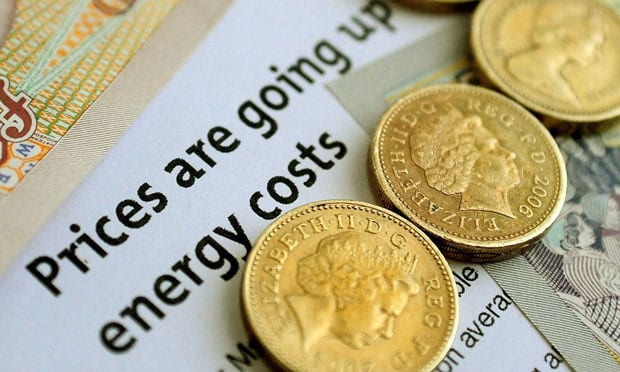'Governments which have handed £895bn of quantitative easing to speculators can also create money to help hard pressed households'.

Prem Sikka is an Emeritus Professor of Accounting at the University of Essex and the University of Sheffield, a Labour member of the House of Lords, and Contributing Editor at Left Foot Forward.
An energy cost crisis is brewing which would impoverish millions and inflict death on thousands. The UK government is in its usual dithering mode.
The UK has failed to invest adequately in electricity generation and gas storage even though about 40% of its electricity is produced from gas. It relies upon imports and is highly vulnerable to market price volatility.
The domestic energy prices are expected to rise by about 50% in the spring. The average pre-crisis household annual energy cost of around £1,277 includes 5% VAT (£61) on domestic fuel. There is a complicated system of green levies which adds £159 to household bills, and hurts the poorest the hardest. In April, the average household bill is expected to rise to £2,000.
Higher prices generate bigger profits for oil and gas companies. BP’s third quarter profits have rocketed to $3.3bn (£2.4bn) and is increasing shareholder returns by $1.25bn. During the last decade, big six energy companies have paid £23bn in dividends and a price hikes will increase their profits too.
The price rises are catastrophic for the people. Around 4 million UK homes are in fuel poverty i.e. struggling to pay their energy bills. By spring, 6 million homes are expected to be energy poor. Higher energy prices will fuel inflation, which will further deplete the spending power of households.
The crisis is deepened by government policies which have eroded household budgets. For the last decade, wages have been stagnant. The government imposed austerity and wage freezes have destroyed household budgets. Universal Credit for millions of families has been cut. Millions of households have suffered loss of earnings due to the Covid-lockdown.
From April 2022, household budgets will be depleted by a 1.25 percentage hike in national insurance contributions. Income tax will rise as the government has frozen tax-free Personal Allowance and income tax thresholds.
The median weekly state pension of between £160.82 and £176.93, as a percentage of average earnings, is the lowest amongst industrialised nations. Despite the triple-lock, some 2.1 million pensioners live in poverty. Some 2.1 million pensioners, mostly women, receive less than £100 a week. In April 2022, the state pension will rise by 3.1% whilst the rate of inflation is already 5.1% and expected to be higher by April.
The age-related Winter Fuel Payment of between £100 and £300 given to senior citizens has remained unchanged since 2011. Faced with low state pension, real-term cut in the pension and Winter Fuel Payment, many retirees face the prospect of premature death.
The government needs to mitigate the crisis and has a number of policy options. These include the following:
- Abolishing VAT on domestic fuel and green levies. Based on the current household bills this would reduce the price to customers by nearly £220 a year and result in loss of £1.7bn VAT to the government. Green levies need to be paid out of general taxation.
- Increasing the Universal Credit. In October last year, the Chancellor removed £4bn i.e. £20 per week, equivalent to £1,040 a year, from 4.4 million families. This needs to be restored. Universal Credit needs to rise to compensate for higher energy and food prices.
- Abandoning the freeze on tax-free personal allowance would boost household income by upward of £1.5bn. Cancelling the planned 1.25 percentage point increase in national insurance contributions would boost household income by another £12bn.
- The Winter Fuel Payment needs to double to take account of the higher energy prices since 2011. The 2020/21 cost of the Winter Fuel Payment was nearly £2bn and therefore this would rise to £4bn.
- By suspending the triple-lock lock on the state pension, the government deprived pensioners of £5.4bn. This needs to be restored.
- A programme of home insulation is needed to increase energy efficiency. It can be funded by a one-off windfall tax on oil and gas companies which would raise about £5bn. Further windfall taxes can be levied on energy companies.
- Increasing the living wage to compensate for higher energy costs.
The above proposals are by no means comprehensive but help the most vulnerable. Governments which have handed £895bn of quantitative easing to speculators can also create money to help hard pressed households. Some would say that such a move would be inflationary. If so, the government can remove cash from the wealthy through progressive taxation.
It can tax unearned income at the same rate as earned income. The application of this principle to capital gains can raise additional £17bn in tax plus another £8bn in national insurance contributions. The same treatment of dividends would raise another £5bn. By extending the 12% rate of national insurance to earned incomes above £50,300, another £14bn can be raised. Numerous other possibilities include a financial transactions and a wealth tax. The only obstacle is the government’s unwillingness to redistribute by inconveniencing the rich.
The above proposals help with mitigating the crisis, but a durable solution requires planning for the long-term, investing in energy generation and conservation, and ending profiteering by energy companies. That requires bringing the energy sector into public ownership.
To reach hundreds of thousands of new readers and to make the biggest impact we can in the next general election, we need to grow our donor base substantially.
That's why in 2024, we are seeking to generate 150 additional regular donors to support Left Foot Forward's work.
We still need another 124 people to donate to hit the target. You can help. Donate today.



